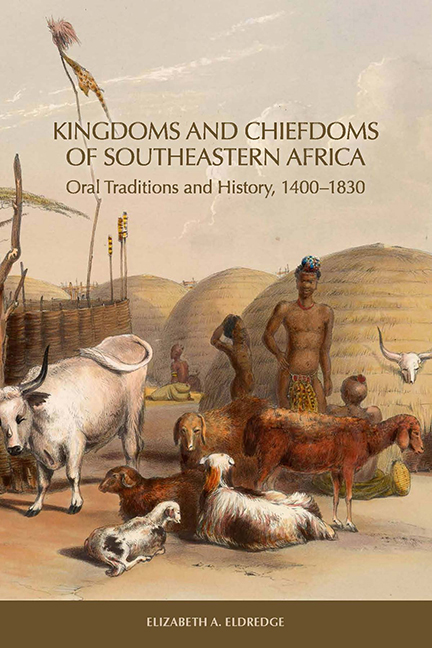Book contents
- Frontmatter
- Contents
- List of Illustrations
- Preface
- 1 History and Oral Traditions in Southeastern Africa
- 2 Oral Traditions in the Reconstruction of Southern African History
- 3 Shipwreck Survivor Accounts from the Sixteenth and Seventeenth Centuries
- 4 Founding Families and Chiefdoms East of the Drakensberg
- 5 Maputo Bay Peoples and Chiefdoms before 1740
- 6 Maputo Bay, 1740–1820
- 7 Eastern Chiefdoms of Southern Africa, 1740–1815
- 8 Zulu Conquests and the Consolidation of Power, 1815–21
- 9 Military Campaigns, Migrations, and Political Reconfiguration
- 10 Ancestors, Descent Lines, and Chiefdoms West of the Drakensberg before 1820
- 11 The Caledon River Valley and the BaSotho of Moshoeshoe, 1821–33
- 12 The Expansion of the European Presence at Maputo Bay, 1821–33
- 13 Southern African Kingdoms on the Eve of Colonization
- Appendix A Ama Swazi King Lists
- Appendix B Chronology of Conflicts, Migrations, and Political Reconfiguration East of the Drakensberg in the Era of Shaka
- Appendix C Interviewees from the James Stuart Collection of Oral Traditions
- Notes
- Bibliography
- Index
1 - History and Oral Traditions in Southeastern Africa
Published online by Cambridge University Press: 14 March 2018
- Frontmatter
- Contents
- List of Illustrations
- Preface
- 1 History and Oral Traditions in Southeastern Africa
- 2 Oral Traditions in the Reconstruction of Southern African History
- 3 Shipwreck Survivor Accounts from the Sixteenth and Seventeenth Centuries
- 4 Founding Families and Chiefdoms East of the Drakensberg
- 5 Maputo Bay Peoples and Chiefdoms before 1740
- 6 Maputo Bay, 1740–1820
- 7 Eastern Chiefdoms of Southern Africa, 1740–1815
- 8 Zulu Conquests and the Consolidation of Power, 1815–21
- 9 Military Campaigns, Migrations, and Political Reconfiguration
- 10 Ancestors, Descent Lines, and Chiefdoms West of the Drakensberg before 1820
- 11 The Caledon River Valley and the BaSotho of Moshoeshoe, 1821–33
- 12 The Expansion of the European Presence at Maputo Bay, 1821–33
- 13 Southern African Kingdoms on the Eve of Colonization
- Appendix A Ama Swazi King Lists
- Appendix B Chronology of Conflicts, Migrations, and Political Reconfiguration East of the Drakensberg in the Era of Shaka
- Appendix C Interviewees from the James Stuart Collection of Oral Traditions
- Notes
- Bibliography
- Index
Summary
By the time King Ngwane V was installed as the King of Swaziland in 1894, the Swazi Royal House could recite forty-one generations of kings through their line of descent, tracing the ruling house back an estimated 1,025 years to approximately 870 CE. A Portuguese shipwreck survivor observed, after meeting a “king” as he traveled through the region of Kwa- Zulu-Natal to Maputo Bay in 1622, “It is a notable thing that these barbarians are respected in their way, and as their race and family are united, their children never lose the territory and kraals left them by their fathers, everything descending to the eldest, whom the others call father and respect him accordingly.” The emergence of well-known southern African kingdoms in the early nineteenth century, such as the famous kingdoms of the AmaZulu, Ama Swazi, and BaSotho, was the culmination of centuries of social and political developments that reflected continuity in the consolidation of the political control of ruling descent lines of small-scale chiefdoms across the entire region. The first complex society emerged in the Trans-Vaal region of modern South Africa along the middle Limpopo River in 850 CE, and by 1400 CE prominent lines of descent of the ruling families of small chiefdoms had been established across southeastern Africa that would give rise to thriving processes of sociopolitical consolidation both east and west of the Drakensberg Mountains by the early 1700s. By the time the first Europeans made their way to southern Africa in 1488, these processes had long since been underway. The purpose of this book is to trace the events and developments of the peoples living in the regions of modern KwaZulu-Natal, Swaziland, southern Mozambique, and Lesotho through these formative centuries to explain the social and political factors impelling the process of sociopolitical consolidation and the emergence of chiefdoms and kingdoms.
How and why did social and political amalgamation occur, causing the emergence of larger-scale chiefdoms and kingdoms? When and why did large-scale migrations and resettlement occur? What events or circumstances propelled hundreds of people to undertake large-scale, long-distance migration and resettlement, and what were the social, political, and cultural consequences?
- Type
- Chapter
- Information
- Kingdoms and Chiefdoms of Southeastern AfricaOral Traditions and History, 1400–1830, pp. 1 - 25Publisher: Boydell & BrewerPrint publication year: 2015



